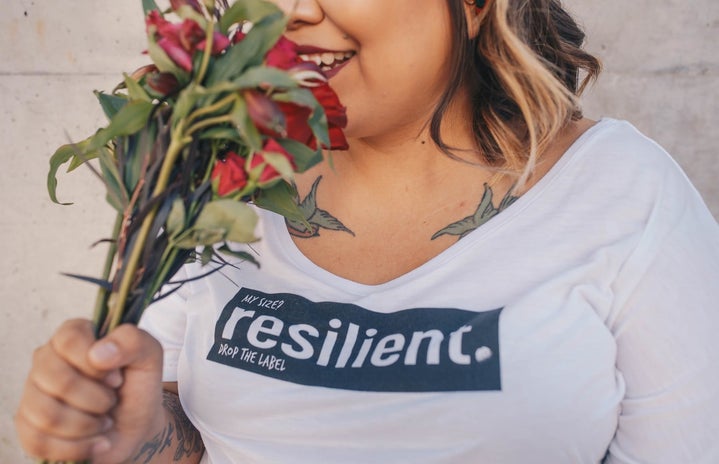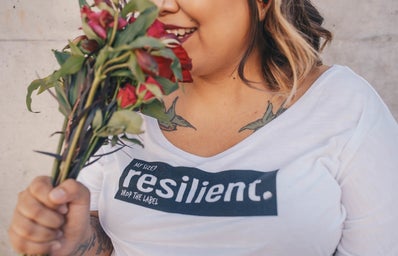Kirsty Dowdall recalls her journey in combating exercise shame
Shame is defined as “a painful feeling of humiliation or distress caused by the consciousness of wrong or foolish behaviour.” This isn’t a pleasant thing to experience in any situation, but I’ve felt it so often when it comes to exercise, I could write a book on it.
We’ve heard all the stories before, exercise releases dopamine and makes you happier, healthier and fitter. But what about when unfit people want to exercise?
You would think that since we are living in a society so obsessed with the concept of getting fat people to change their habits and live healthier lifestyles that there wouldn’t even be an uttered concept of shaming fat people for adding some exercise into their daily routine. But sadly, this is not always the case.
As a fat person I constantly feel the pressure to lose weight. I’m not obese, most people probably wouldn’t think of me as a “fat person”, and keep in mind I use the term “fat” with no malice. Fat isn’t a bad thing. Everyone has it.
But in this world where plus-sized models are criticized for “promoting obesity” on the cover of fitness magazines and stores are under fire for having plus-sized mannequins it’s hard to understand where the world wants people like me to be?
So, dealing with the shame? Dealing with the people who berate you for your body and your attempts or lack of attempts to love it? How do I suggest you do that?
Accept you’re the one making a conscious decision to improve yourself.
You’re out shopping for new gym-wear and someone sniggers at you while you’re browsing through the gym leggings. It’s not a rarity. People look at overweight or unfit people in sports shops or looking at gym equipment all the time and make faces or remarks. These people don’t think of the effect it can have, they don’t think “oh well maybe this person is actually very sporty and I have absolutely no clue what I’m talking about?”. They just judge. Thin people look down on other people who are beginning to get a grip on what they’re doing in this scary world of protein-shakes, lifting and gym bunnies.
But at the end of the day if you’re making a conscious decision to improve yourself and better yourself, you’re the winning party. Everyone starts somewhere. One day when you’re where you want to be, you’ll know you’ve bettered yourself. You’ll know that you have made steps towards doing something good, but those people will still just be nasty and insecure.
Follow accounts on social media that make you feel good about yourself.
Instagram can be a black hole for toxicity, especially when you’re only starting out exercising and so many of the “fitspo” accounts and self-acclaimed PTs can make you feel like there isn’t a hope of you getting anywhere.
There’s a lot of negativity towards fat people, unfit people and just people who genuinely are only newbies to the whole “gym-going” getting fit thing. This negativity is all over Instagram, Twitter and so many other sites. At least weekly I see a video of someone who might be overweight, unfit or just not have a clue what they’re doing, trying their hardest in the gym and being mocked as a result of it. There’s no excuse for this. People are shamed when they don’t actively want to change themselves when they’re not what society deems as ‘acceptable’ and they’re shamed when they are.
There’s no ‘fix-all’ for some people’s awful attitudes but the main advice I can give is to follow people who are at a similar fitness level to you and embarking on similar journeys. It can seem like you’re the only person in the world who’s struggling to do 30 squats or five push ups, but I guarantee you’re not. Follow people who are having similar struggles, doing the same things and then you can grow with them.
I’m not saying don’t follow people who are at a place where you aspire to be, but if you’re feeling ashamed of yourself looking at their posts or their progress, it’s worth considering hitting the unfollow button. Feeling shame regarding your progress compared to theirs isn’t a good use of your time because I guarantee once upon a time, they were at a similar stage to you. It’s all relative.
Finally, practice self-acceptance even if self-love can be hard sometimes.
We’re living in a world where people rage that somebody is promoting obesity by just existing. It’s been seen countless times – when Ashley Graham was the first plus-sized model on Sports Illustrated, when Nike displayed their first plus-size model in their London store.
People regardless of body type, body shape and weight are consistently criticized for existing. For practicing self-acceptance and self-love, regardless of whether or not they desire to change themselves, or not.
People should be allowed to exist without criticism regardless of what they weigh, regardless of whether or not they’re exercising to get fitter, lose weight or just for fun. We as a society shouldn’t make assumptions on someone’s health based on their weight, it’s not a valid assumption. Fit is not confined to one specific body type and healthy is not confined to one specific weight.
Allow yourself to accept yourself the way you are right now and embrace that no matter what level of exercise you are comfortable doing, is enough. The only person who has the right to comment on your health is yourself and your doctor.



